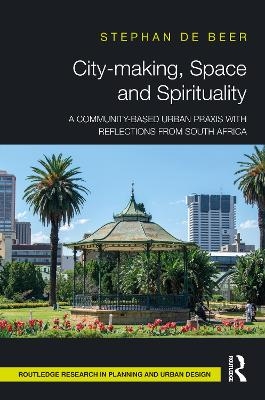
City-making, Space and Spirituality
Routledge (Verlag)
978-1-032-37223-5 (ISBN)
The first part of the book invites planners, city-makers, and ordinary urban citizens, to consider a new self-understanding, reclaiming their agency in the city-making process. Through the metaphor of "becoming like children", planning practice is deconstructed and re-imagined. A praxis-based methodology is presented, cultivating four distinct moments of entering, reading, imagining and co-constructing the city. After deconstructing urban spaces and discourses, the second part of the book explores a concrete spirituality and ethic of urban space. It argues for a shift from planning as technocracy, to planning as immersed, participatory artistry: opening up to the "genius" of space, responsive to urban cries, and joining to construct new, soul-full spaces. Local communities and interconnected movements become embodiments of urban alternatives – through resistance and reconstruction; building on local assets; animating local reclamations; and weaving nets of hope that will span the entire city.
Providing a concrete methodology for city-making that is rooted in a community-based urban praxis, this book will be of interest to urban planning researchers, professional planners and designers and also grass-root community developers or activists.
Stéphan de Beer is an urbanist-theologian, passionate about cities that are radically inclusive, both socially and spatially. Previously, he led a community-based organization in the inner city of Tshwane, focusing on vulnerable people and places, and creating responsive social and housing infrastructure. Currently, he is Professor of Practical Theology and director of the Centre for Faith and Community at the University of Pretoria. With doctoral qualifications in theology and urban planning, he seeks to traverse disciplines and boundaries in undoing the apartheid city. He convenes the Urban Studio and the Unit for Street Homelessness, connecting scholarship, neighbourhoods and the streets. He believes that spirituality made concrete can help transform urban places.
Preface: stories, being storied, re-storying Introduction: why embark on this journey? Part 1: Epistemology – Identity – Methodology 1. "To know as we are known": towards a contextual-narrative planning epistemology 2. "Becoming like children": identity and urban praxis 3. A praxis-approach to city-making: critical moments in the journey Part 2: Doing the city together First Moment: Entering Urban Space 4. Personal and Community Narratives: Berea-Burgers Park and Tshwane’s inner city Second Moment: Reading Urban Space 5. Planners, Participation, the Poor 6. What has become of city-making? Between fallacy, deficiency, commodity and conspiracy Third Moment: Imagining Urban Space 7. Discovering an alternative imagination: towards a spirituality of urban space 8. Embodying an alternative imagination: practicing an ethic of urban space Fourth Moment: Constructing urban space 9. Communities and movements of hope: between resistance and reconstruction 10. Fostering an integrated community-based urban praxis Conclusion
| Erscheinungsdatum | 03.10.2023 |
|---|---|
| Reihe/Serie | Routledge Research in Planning and Urban Design |
| Zusatzinfo | 2 Tables, black and white; 9 Line drawings, black and white; 46 Halftones, black and white; 55 Illustrations, black and white |
| Verlagsort | London |
| Sprache | englisch |
| Maße | 156 x 234 mm |
| Gewicht | 620 g |
| Themenwelt | Naturwissenschaften ► Biologie ► Ökologie / Naturschutz |
| Naturwissenschaften ► Geowissenschaften ► Geografie / Kartografie | |
| Sozialwissenschaften ► Soziologie ► Spezielle Soziologien | |
| ISBN-10 | 1-032-37223-0 / 1032372230 |
| ISBN-13 | 978-1-032-37223-5 / 9781032372235 |
| Zustand | Neuware |
| Informationen gemäß Produktsicherheitsverordnung (GPSR) | |
| Haben Sie eine Frage zum Produkt? |
aus dem Bereich


